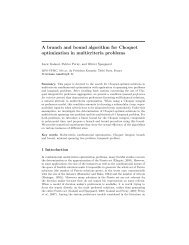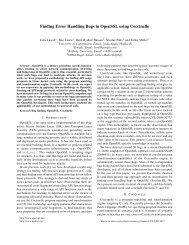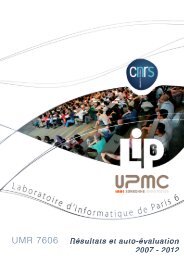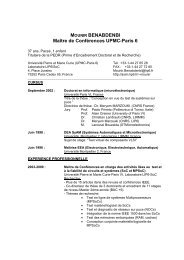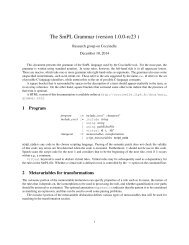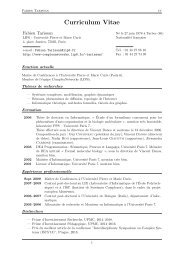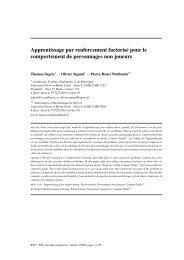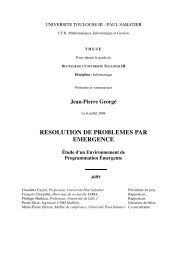Proceedings [PDF] - Measurement and Analysis of P2P Activity ...
Proceedings [PDF] - Measurement and Analysis of P2P Activity ...
Proceedings [PDF] - Measurement and Analysis of P2P Activity ...
You also want an ePaper? Increase the reach of your titles
YUMPU automatically turns print PDFs into web optimized ePapers that Google loves.
International Conference Advances in the <strong>Analysis</strong> <strong>of</strong> Online Paedophile <strong>Activity</strong> Paris, France; 2-3 June, 2009<br />
Sex Offender Online Behaviour<br />
There is, however, increasing evidence that the Internet is used by some<br />
adults to access children <strong>and</strong> young people in order to groom them for the<br />
purposes <strong>of</strong> sexual abuse. MySpace have recently expelled 29,000 suspected<br />
sex <strong>of</strong>fenders <strong>and</strong> are being sued in the United States by parents who claim<br />
that their children were contacted by sex <strong>of</strong>fenders on the site <strong>and</strong><br />
consequently abused. The Internet also plays a role in facilitating the<br />
production <strong>and</strong> distribution <strong>of</strong> indecent illegal images <strong>of</strong> children, which may<br />
encourage <strong>and</strong> complement online grooming.<br />
Davidson <strong>and</strong> Martellozzo (2008: 277) suggest that Internet sex <strong>of</strong>fender<br />
behaviour can include: "the construction <strong>of</strong> sites to be used for the exchange<br />
<strong>of</strong> information, experiences, <strong>and</strong> indecent images <strong>of</strong> children; the organization<br />
<strong>of</strong> criminal activities that seek to use children for prostitution purposes <strong>and</strong><br />
that produce indecent images <strong>of</strong> children at a pr<strong>of</strong>essional level; the<br />
organization <strong>of</strong> criminal activities that promote sexual tourism". Child<br />
grooming is a process that commences with sexual predators choosing a<br />
target area that is likely to attract children. In the physical world, this could be<br />
venues visited by children such as schools, shopping malls or playgrounds. A<br />
process <strong>of</strong> grooming then commences when <strong>of</strong>fenders take a particular<br />
interest in the child <strong>and</strong> make them feel special with the intention <strong>of</strong> forming a<br />
bond. The Internet has greatly facilitated this process in the virtual world.<br />
Offenders can now seek out their victims via online games <strong>and</strong> social<br />
networking sites. According to Wolak et al. (2008), most Internet-initiated sex<br />
crimes involve adult men who use the Internet to meet <strong>and</strong> seduce underage<br />
adolescents into sexual encounters. The <strong>of</strong>fenders use Internet<br />
communications such as instant messages, e-mail, <strong>and</strong> chat rooms to<br />
organize meetings <strong>and</strong> develop intimate relationships with victims.<br />
Child sex <strong>of</strong>fenders are forming online communities <strong>and</strong> bonds using the<br />
Internet. They are openly uniting against legal authorities <strong>and</strong> discussing ways<br />
to influence public thinking <strong>and</strong> legislation on child exploitation. While<br />
paedophile web sites are being tracked down <strong>and</strong> removed from Internet<br />
servers in countries all over the world, they are popping up again at a higher<br />
pace in most parts <strong>of</strong> the world.<br />
42


![Proceedings [PDF] - Measurement and Analysis of P2P Activity ...](https://img.yumpu.com/32964521/42/500x640/proceedings-pdf-measurement-and-analysis-of-p2p-activity-.jpg)
